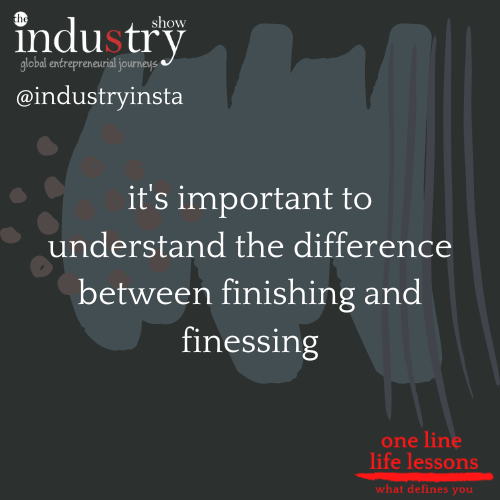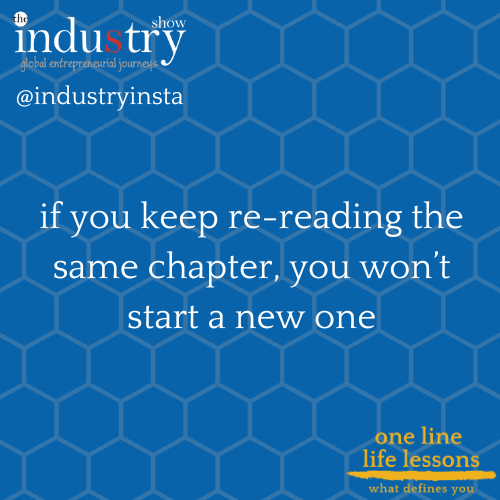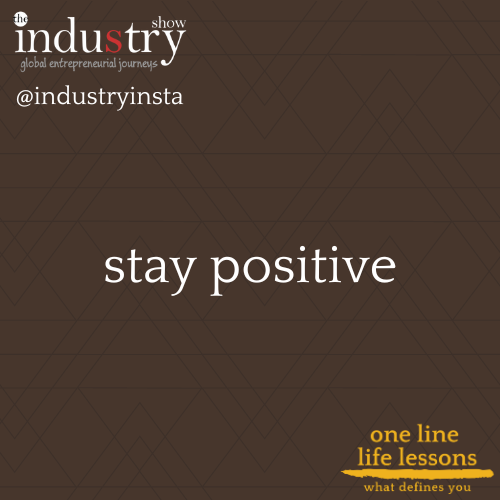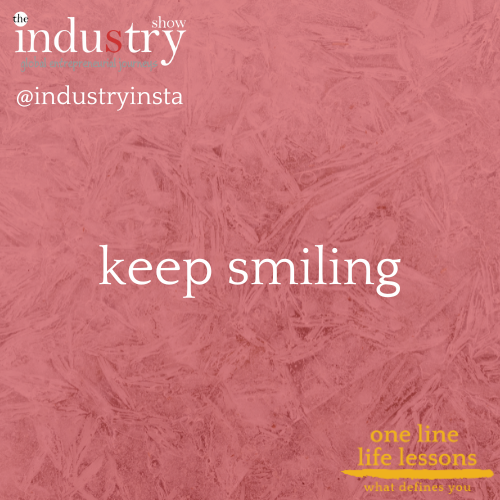Sep 28, 2024
Daivata
Chavan-Patil
Daivata Chavan-Patil is the creative producer at Onjal Arts Production – producing commercials and Marathi feature films. She co-founded DHUP Foundation – a nonprofit empowering girls and women in India. Daivata is a recipient of the Women of Excellence award by Women Economic Forum.
One Line Life Lessons from Daivata





Episode Highlights
- 0:00 – Daivata Patil introduces herself as a storyteller and filmmaker, discussing her role as co-founder of Onjal Arts.
- 1:15 – Patil explains the mission of Onjal Arts, focusing on producing content that tackles social issues while engaging audiences.
- 2:30 – She shares her perspective on the importance of media in democracy and its ability to influence societal attitudes.
- 3:45 – Patil recounts how a college short film inspired her to address pressing topics through collective storytelling.
- 4:50 – She discusses their first film, released in 2018, which highlights the pressures students face regarding academic success in India and promotes following passions over traditional career paths.
- 6:15 – Patil previews their upcoming film, set to release in December, focusing on women’s reproductive rights and biases against female children, showcasing a healthcare worker’s efforts in a village.
- 8:00 – She reflects on the challenges faced by content creators in the post-COVID-19 digital landscape, particularly for regional producers competing against larger entities.
- 9:30 – Patil expresses appreciation for the loyalty of local audiences amidst the competition.
- 10:45 – She discusses the transformative potential of digital platforms and AI, highlighting the need for adaptation in the face of changing job landscapes.
- 12:00 – Patil shares a personal story about a failed project, emphasizing the importance of recognizing when to cease unproductive efforts.
- 13:30 – She recounts her experiences at the United Nations on women’s empowerment and the significance of mentorship.
- 15:00 – Cooking as a therapeutic outlet is discussed, showcasing how it provides balance and joy in her life.
- 16:30 – Patil shares her admiration for the Mahabharata and its rich narratives, recommending related books on empowerment and nature.
- 18:00 – She emphasizes the importance of authenticity over perfection, maintaining a positive outlook, and celebrating personal achievements despite industry challenges.
- 19:30 – Daivata Patil concludes with a call to action for aspiring storytellers and creators to stay true to their passions and engage with social issues.
Show Transcript
Transcript - Full Episode
[00:00:00 – 00:00:09] Nitin Bajaj
Everyone. Welcome to the industry show. I’m your host, Nitin Bajaj. And joining me today is Daivata Patil. Daivata, welcome on the show.
[00:00:09 – 00:00:16] Daivata Patil
Thank you. Thank you, Nitin. It’s wonderful to be invited to your podcast. It’s an honor.
[00:00:16 – 00:00:19] Nitin Bajaj
It’s great to have you here. Tell us who is Daivata?
[00:00:19 – 00:00:40] Daivata Patil
Daivata is a storyteller. She cooks up the stories and she’s great at narration. And probably that’s what brought me into filmmaking. You can say that a lot of stories are made up for me in the surrounding, some of it are my own personal narratives and probably that is what keeps me going in what I’m doing right now.
[00:00:41 – 00:00:56] Nitin Bajaj
Tell me more about what you do, what is Onjal Arts and I’m always curious to learn why somebody starts something and how it comes about. So tell us a little more about Onjal Arts and how you got started and why.
[00:00:57 – 00:02:07] Daivata Patil
Onjal Arts is, both a business as well as a personal venture. Let me just start with the business venture and then I’ll come to the personal story of it. When we see content around us, I have a feeling that very few, sensible, content makers are around. Like media is the 4th pillar of democracy and it has an important role to play in a societal shaping up society mindset. And therefore, the platform or benchmark of phones are Arts-production sets. We thought that we will come up with social issues, issue based content, which will not only entertain, but also sensitize people or various issues. So that was the idea behind starting Onjal Arts production.
I started this with my husband, who’s my life partner and my business partner. And, together we had in our college days started a short film and the name of it was Onjal. So Onjal basically means, a handful of, like this, when you do this is called Nitin Marathi. So this was the thought behind starting this, the short film and today 22 years down the lane, we are there with that professional setup.
[00:02:08 – 00:02:30] Nitin Bajaj
Yeah. And it’s amazing to get to share that with your life partner also. So that’s awesome. Congratulations on coming to Spark. Tell us a little more about the impact you’ve been able to create in terms of the stories, the documentaries, the films that you’ve been able to share with our community?
[00:02:30 – 00:04:28] Daivata Patil
Documentary is only one so far that was also for the World Bank, but we are not more into documentaries. We’ve made television promos, commercials, and films. Film, of course, is a passion. Commercials are bread and butter. We’ve made 2 films so far. The first one was released in 2018 and the team line of that film was to a standard be the benchmark of a student’s career life. Being a media educator and a mother of 13 year old kids, I’ve seen that there’s a lot of societal pressure on the kids, and also the parent pressure that 12 and 10 standard is the benchmark of your educational life. And if you don’t score well, your life is doomed. And of course that leads to a lot of, stress and a number of suicidal cases also are increasing because of that. And probably that set the benchmark for our 1st film and it talks about can 12 standard be the benchmark of students’ life. And also in India, there’s this fascination about becoming a doctor and engineer. If you are neither of them, then you are like, you cannot set anything in your career. So that can be the case.
Those can be the 2 last career options in life. Let the child choose, their passion was the message that we want to give. The second film, which is due to be released in December, talks about reproductive rights of women. Can, no. It’s a societal pressure that there has to be a boy, child, main child in the family and the law of superstitions around it. So this particular film where a health care worker tries to help out another village of women, and she’s trying to ensure that she’s getting a Daivata delivery in the hospital, which probably is one of the major concerns. Of course, over the years, there has been a significant rate, growth rate in reducing maternal death rate. So that is the plot.
[00:04:29 – 00:05:33] Nitin Bajaj
Very important causes that you’re bringing to life with your productions. Having gone through the same education system, I can relate to and know firsthand of the pressures we have when it comes to your 12 standard rank and marks and all of those things. And also can tell you from my personal experience that it’s okay. Right? There are many things that contribute to your life, to, your success and even the definition of success. So it’s very important, and I’m glad you’re bringing, both, women’s reproductive rights and children and their careers and how they should get a say and a choice in making these decisions. So I applaud you for taking on these important topics, and I’m sure they’re not easy to narrate and easy to bring to life.
So thank you for doing what you’re doing. As you’re dealing with these important topics that are challenging for millions of people, I’m curious to learn about the one challenge that you’re facing.
[00:05:33 – 00:07:02] Daivata Patil
I think it’s not just one challenge that I’m facing. It’s, across all media houses which I don’t think suggest in India, but across the globe, they’re facing the media disruption. Before COVID and after COVID, there has been a significant difference in the way media content is delivered, distributed, and consumed. There has been a shift to Daivata platforms. Of course, that shift was due. It was to come, but it came a little ahead of his time and probably, you know, via media, content producers are facing a challenge. You find the audiences, monetize them, understand which platform is what media, you know, audiences are liking and whether they are able to pay for that or not.
So that is one challenge that I see in particular. More so being a regional content, the challenges are next level because when you are dealing at a national level, your audience size is big. And when you’re dealing at the regional level, it automatically cuts down to 126 or 127th of the audiences. More so, because I’m in Maharashtra, there is a Bollywood in Mumbai. So, there is a strong competition from Hindi content producers, and they are big fishes. Like, they are the whales, and I’m a small fish in the sea. So that’s a big challenge.
But, yeah, we are thankful that the regional audiences are loyal. If there’s something good content that is delivered, they do come back and they do applaud and recognize your thoughts. And I think that I’m thankful to them that they did it in my first film. It was a commercial hit.
[00:07:03 – 00:07:12] Nitin Bajaj
That’s amazing. That’s great to hear. Now let’s talk about opportunities. I would love to hear what is the most exciting opportunity that’s in front of you.
[00:07:14 – 00:08:30] Daivata Patil
Opportunity? I think I compare the situation right now in the media business to what globalization brought to India Mhmm. Back in the nineties. When media businesses were brought proliferating, corporatization of media was happening, there were a lot of opportunities. Whoever entered the media, got a job, got a good profile, started the business. They learned, you know, successful ventures barring a couple of exceptions. 20 years, 25 years down the lane, I see that, digital media and artificial intelligence, there lies an opportunity.
I think I would look at it from the flip side of it. When people say that AI is going to kill the opportunities in the market and a lot of people will be losing jobs. I don’t think so. That’s the case because every new thing brings up a lot of opportunities and then it kills all the opportunities. So, of course there will be some jobs which will be lost, but there will be a lot of opportunities which will be created. If you’re with the time and are able to understand the nuances of the market and the audiences, I think you’re there. So I’d seek this as a very good time.
Those who are able to synthesize digital technology are able to understand the audiences, digital audiences particularly, and also are able to shift the traditional audiences to the digital spaces in the right manner. I think a very good marketplace can be created.
[00:08:31 – 00:09:46] Nitin Bajaj
I agree with you. Every disruption comes with an opportunity to go in. And you mentioned the globalization that happened in the early to mid nineties. I was fortunate to be experiencing that when suddenly we had instead of just doing darshan, we had tons of options. And I remember those days when you couldn’t decide what to watch. There were so many compared to the 2 or 3 things that you could watch before that happened. So I agree with you.
There will be a lot more choices, not just for the consumers, but also for the creators. And that always brings about a lot more opportunities. Now as we look into the future, I always like to take a moment and look back in the past in the rear view mirror. And I would love for you to share a couple of moments. One that did not work out as you had expected, and there were lessons maybe from failure. And another experience that was a success beyond your imagination. So I would love for you to share an example of each of those.
[00:09:48 – 00:12:25] Daivata Patil
Let’s talk about failure first. It was my 2nd film, which never rolled out, never bent to the floor. We announced it and the lockdown happened. Most of the shootings on the floor were stopped. And thankfully, the Arts-production had just started, so I did not invest much money. Money wise, it was not a loss, but it did give a lifelong lesson to me that sometimes you need to listen to your inner soul and you need to understand when to stop. You should not just get carried away.
Since I’ve started, I should finish it. Sometimes that’s not needed. Of course, things that you start, you need to finish. That’s an age old saying, but it’s important to realize when to stop, when to not pursue things that you started. Sometimes not starting is also something good that you’re doing to yourself. Probably, I realized in the beginning of the lockdown that this is not going right. It’s not one of those short term lockdowns where I should pursue it and take it ahead.
So very timely, I realized that I had to stop and everything was on standstill so I could save a lot of money that I was planning to invest. So that’s a lesson from a failure. There are many successes, but I don’t wanna talk about material successes. Of course, like I can count some of them, I was invited to the United Nations this year to share my views on women empowerment. I think that at some moment, I’m someone who works in the cause of women empowerment and gender equality and, you know, being invited to the United Nations is like doing Mecca and Haridwar, Kashi. And it’s how I look at it. There were awards and all.
The first film was a success. But I think more real success is something that touches your heart. And I remember this one moment where I got a call from one of my past students. And after 10, 12 years, she calls me suddenly and she says, you know what? I am divorcing my husband right now, and thanks for giving me this courage. I said, we have not been in touch for 12 years. And how do you say this?
She said for 10, 12 years, you were with me throughout my ups and downs. Whenever I wanted to take a career decision or Patil decision or, wherever I had, I faced hurdles, You were the first person that came to my mind. And I used to think that how will you react to the situation and that guided her 10, 12 years of struggle. I was moved by that call, and I literally was not able to sleep on that day. I think I would count that as my real success where you are able to successfully mentor someone to the extent that that person you become the source of inspiration to that person for, like, 12 years. And that I still get goosebumps when I remember that call.
[00:12:25 – 00:13:10] Nitin Bajaj
That’s a beautiful experience and story. It is where you don’t even know you’re inspiring someone, which means it’s truly selfless and you’ve done your best to share what you believe in and what your values are. And it resonates with somebody else. And I think that I agree with you 100%. That is true success. Because everything else is defined by somebody else. And in this case, you are able to take what you believe in and share it with others and help them in making the right decisions for themselves.
So congratulations on that. Now to step aside from some heavy talk, I would love to hear from you what you do for fun to de-stress, to kick back, and relax.
[00:13:12 – 00:13:59] Daivata Patil
Fun activities depend on who the partner is, exactly speaking. Serious partner, then the fun activity can be a little on the serious side if it’s, younger one, then it’s playing and all. But, truly, I think what satisfies me is cooking. So I consider that as cooking. Cooking is one of the therapies that whenever I’m stressed or whenever I’m happy or I’m very angry, then I just head straight to the kitchen and start cooking. So when I’m very angry and even frustrated, I choose one of the most complicated dishes. I think by the dish, it just brings you down to your normal.
And my husband’s, I should do this all for you more often because that’s when I get to eat the best of the dishes. So I think my fun activity is cooking.
[00:14:00 – 00:14:14] Nitin Bajaj
I love that. I love that you put yourself in a position of challenge and take your mind off before distressing you, and that brings us another best part of you. That’s really cool. Now
[00:14:14 – 00:14:15] Daivata Patil
Thank you.
[00:14:16 – 00:14:32] Nitin Bajaj
You obviously must consume a lot to be able to produce what you do. So I’m curious to know if you have any book or podcast that is a favorite that you would want to share with our audience.
[00:14:34 – 00:14:39] Daivata Patil
I think being a storyteller, I feel Mahabharata has been one of the greatest storytelling formats as well as the stories, the side stories that come. It has always fascinated me, and till today, it keeps doing it. The stories of Mahabharata by Ranbir, is something that I would recommend to everyone. Then the last book that I read was, The bitch by Lucy Cook. It talks about the women or rather the female species has been more powerful in the animal world. So I would highly recommend that it just changes your perspective of looking at the female species in a very empowered manner. The current book that I’m reading is by Michael Pollan.
It is the botany of desire. It talks about desire from the botany sense, like the plants and the fruits, how it invokes the sense of desire in use. I think that was a very different take by the author. I’m still reading it, but whatever I’ve read, I think I’ll recommend this to readers. And of course, your podcast is highly
[00:15:35 – 00:15:50] Nitin Bajaj
Thank you. You’re very kind. But, yeah, the Nitin book sounds really interesting. I will take a look at that. Thank you for sharing. Now on to my favorite part of the show, which we call the one line life lessons. I would love for you to share your life lessons with us.
[00:15:50 – 00:17:04] Daivata Patil
I’ll share 3 of them. Sure. One is that sometimes it is important to understand the difference between finishing and finishing. So not always you have to finish things. Not always you have to finish things. Sometimes you need to prioritize that to just to save your time and also get clarity. You can’t be perfectionist in everything.
And that goes to the second one liner of me that it’s better to be real than be perfect. You just get burdened with the pressure of being perfect. And in that journey, you just forget who you really are. So I think being Patil said that that just de-stresses a lot of pressure on your personality, as well as you as a leader, you’re able to not waste and invest your time, energy, and resources, mental resources, and something which is deviating you. But one is, if you keep reading the current chapter again and again, you will never start the new chapter. Right? So sometimes it’s better to leave the old one to start a new chapter.
And, 2 things are to think positive and keep smiling. That’s what I always do. People in my circle call me laughing Buddha. So I always believe in smiling. It just de-stresses you and the other person also.
[00:17:05 – 00:17:44] Nitin Bajaj
So true. That’s a beautiful title to have. That’s an amazing image to cultivate and be known for. So congratulations for doing that. It’s not easy and definitely not easy in the industry you’re in, which is full of lots of stress, lots of moving parts, cancellations, delays, and then, of course, everything that happened here in the last few years. So kudos for you to keep the right thing in perspective, know what’s important, and focus on that. And also for this amazing journey that you’ve had over the last 22 years, congratulations for that, and wish you many more successes.
[00:17:45 – 00:18:01] Daivata Patil
Thank you, Nitin. Thank you for inviting me here. It was wonderful to interact with you on a beautiful Sunday morning. Not Sunday morning. Weekday morning, actually. I hope it was a Sunday morning, but, yeah, we’re working on a Monday. It was a pleasure interacting.



